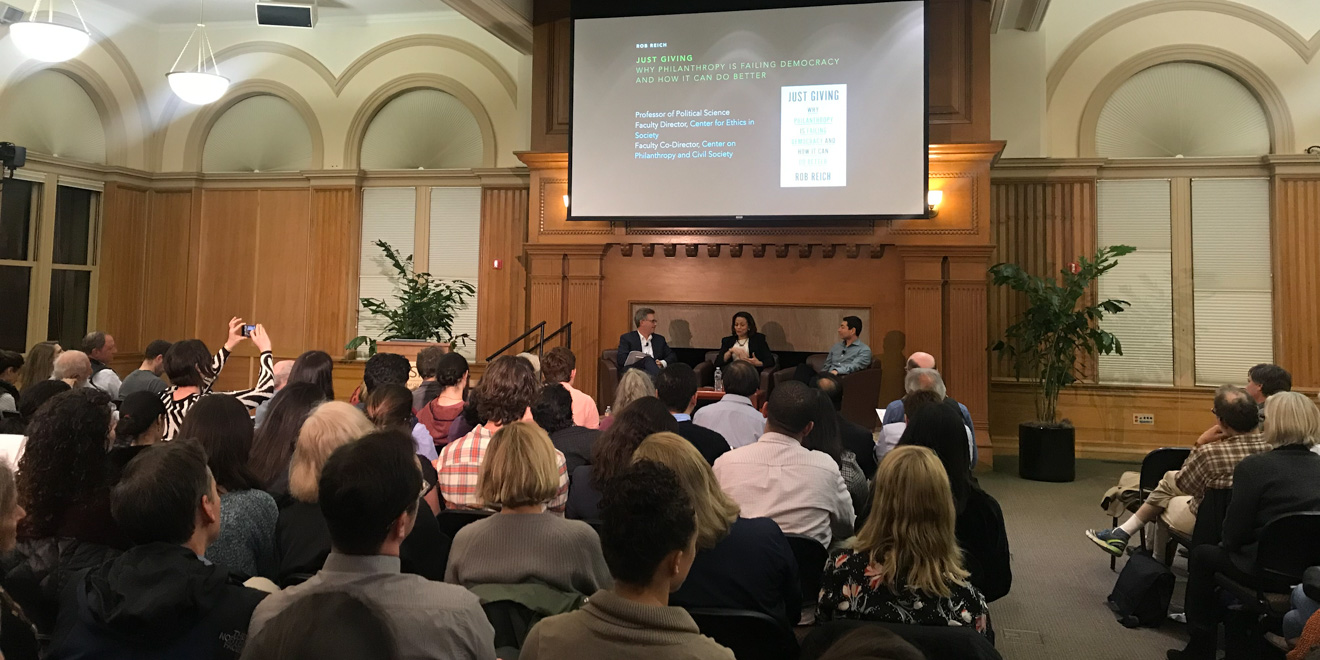On Tuesday, political science professor Rob Reich held a launch event for his new book, “Just Giving: Why Philanthropy is Failing Democracy and How It Can Do Better.”
The book centers on what Reich sees as the hidden negative impacts of philanthropy, offering solutions to the problem and suggesting ways in which philanthropy can be redeemed.
The event began with a keynote speech by Reich and was followed by a panel with two speakers: Stanford Law professor Mariano-Florentino Cuéllar and incoming President and CEO of the Silicon Valley Community Foundation Nicole Taylor.
“I want to examine the ethical and political dimensions of philanthropy [and] in particular how the act of giving is not the unassailable or automatic good thing that we often think it to be,” Reich said.
The talk began with Reich using public school donations as an example of philanthropy that can end up being harmful. Public schools in wealthier districts receive bigger philanthropic donations than those in poorer districts, he explained, which can worsen economic disparities between the two.
“Here is an example of charity that does not serve to address disadvantage,” he said. “In fact, it serves to amplify and exacerbate advantage.”
Another issue Reich highlighted was discrepancies in the tax breaks given to people in different income brackets. The higher a person’s income, the bigger their tax break is and the greater the decrease in their taxes per charitable donation.
As a solution to this issue, Reich suggested that tax breaks for philanthropic acts should not depend on income. He also proposed having individuals donate to a more diverse set of charities.
“What’s valuable about charity is the diversity and pluralism of associational life,” he said.
Reich also used John D. Rockefeller and the Rockefeller Foundation as an example of the danger of “big” philanthropy, arguing that creating such foundations puts more power into the hands of already powerful people.
“The appropriate attitude to power is not to thank people for wielding it but to scrutinize people to see whether it supports, rather than undermines, our democratic ideals,” he said.
Reich added that, because big philanthropists don’t face the same sort of consequences that government bodies do, they should leverage their unaccountability for good by directing donations to long-term, more experimental donations.
“Foundations are a great source of risk-taking for creative problem-solving,” he said.
During the follow-up panel, Taylor said she thinks that the thought process behind how big philanthropists approach their work is already shifting.
“I think people who are in this business realize that maybe there is a different way that we can go about looking at our role in democracy and our role in making our communities better,” she said.
During a subsequent audience question period, Stanford Law Professor Emeritus Paul Brest brought up a concern he had with Reich’s work.
“I think the book is myopic in a certain kind of way,” Brest said. “It ignores the corporate sector entirely.”
But Reich said that the purpose of the book was not to find out what the biggest threat to democracy is. Instead, he said, the purpose was to examine the pitfalls of modern-day philanthropy.
“If you took away one message from the book, it’s the idea that both scholars and citizens need to pay far greater attention to the phenomenon of philanthropy in American society and in democratic society in general, and that philanthropy deserves our scrutiny, not just our gratitude,” he said.
Contact Clara Kieschnick at ckiesch ‘at’ stanford.edu.
